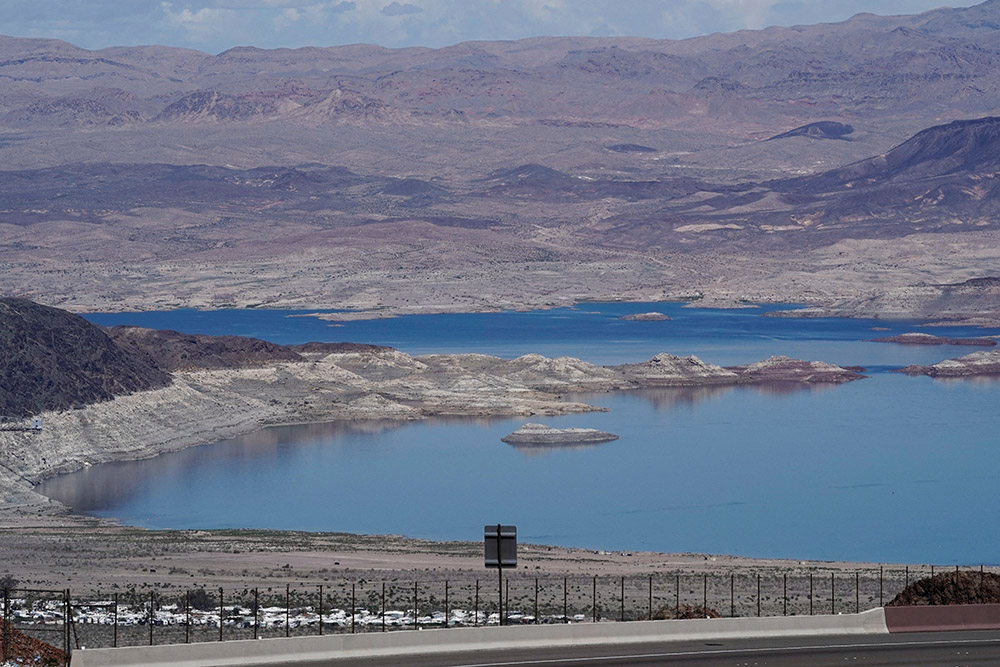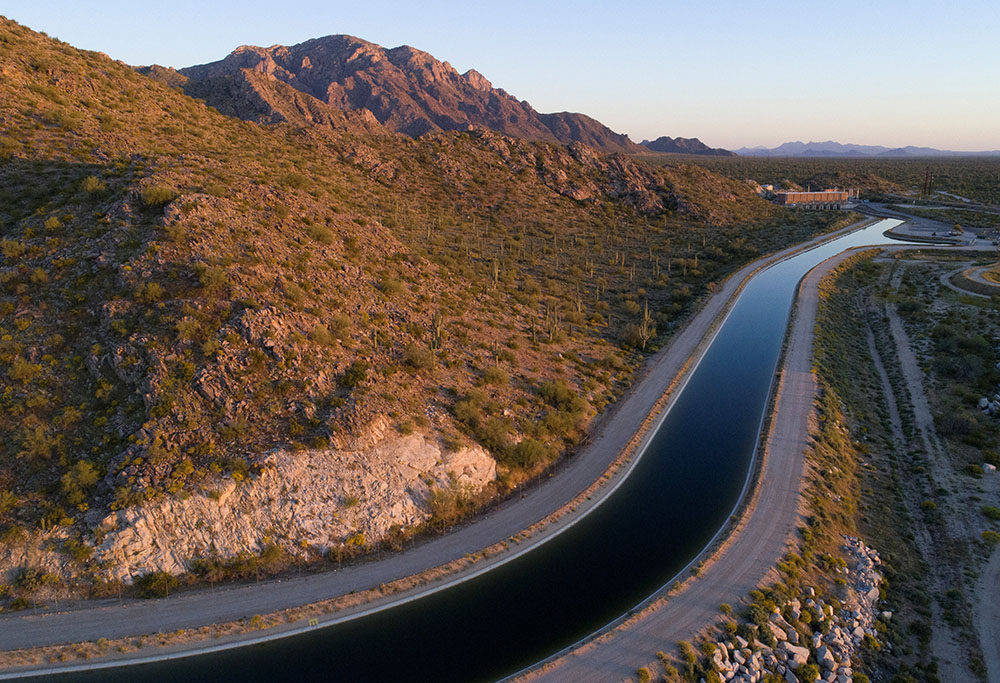
An elevated view shows the dramatic decline of water levels at Lake Mead near Boulder City, Nevada, March 13. The nation's largest reservoir has reached its lowest water levels on record since it was created by damming the Colorado River in the 1930s, as growing demand for water and climate change shrink the Colorado River and endanger a water source millions of Americans depend on. (OSV News/Reuters/Bing Guan)
When renowned science fiction author Robert Heinlein wrote in his apocalyptic 1952 short story "The Year of the Jackpot" that "the Colorado River was at a record low and the towers in Lake Mead stood high out of the water. But the Angelenos committed communal suicide by watering lawns as usual," such a scenario was still the stuff of fantasy.
But imagination sometimes has an uncomfortable ability to become reality. The American Southwest is in the grip of a megadrought that jeopardizes the Colorado River and, with it, water supplies for major U.S. population centers and farm producers.
Representatives from Arizona, California, Colorado, Nevada, New Mexico, Utah and Wyoming reached consensus May 22 to use 3 million fewer acre-feet of water by the end of 2026. An "acre-foot" of water is equivalent to 326,000 gallons.
Arizona, California and Nevada in particular agreed to the federal government's proposal to try to save the 1,450-mile-long Colorado River from going dry by reducing their water intake 13%.
This scale of water conservation is thought to be unprecedented — but a motivational nudge was given by the federal government last June, when the states were told to figure out how to use less water, or the government would do it for them.
Catholics in some of the affected states are complementing the government's effort to prevent disaster with principles of Pope Francis' landmark 2015 environmental encyclical Laudato Si' firmly in mind.
Advertisement
"Creation Care Ministry recognizes water conservation as critical, especially here in southern California, where a long history of drought has had and continues to pose a significant impact to the poor and vulnerable," said Christina Bagaglio Slentz, associate director of Creation Care in the San Diego Diocese's Office for Life, Peace and Justice.
"Not only is there a cost in terms of increasing financial expense, but there is also a major threat to livelihood, human well-being and biodiversity," Slentz said. "In particular, the Diocese of San Diego includes the Imperial Valley, where the agricultural sector draws more water from the Colorado River than Arizona and Nevada combined."
This combination of climatic circumstances and water-dependent industry has resulted in a focused approach to water conservation and equity efforts for the diocese, Slentz said. The diocese's Laudato Si' Action Plan for the coming year is to work to build community resilience while ensuring environmental justice.
"We are also currently engaged with the San Diego County Water Assembly efforts to promote water equity throughout our region, to include the Imperial Irrigation District," Slentz said. "Relatedly, we are working with a team from San Diego State University in the creation of a Prevention Research Center based at SDSU-Imperial Valley focused on using an evidence-based intervention for mitigating the effects of extreme heat."
The San Diego Diocese's Creation Care Action Plan — finalized and approved by Cardinal Robert McElroy in 2021 — has no less than 115 mentions of water. The plan is connected to the Laudato Si' Action Platform launched in 2021 by the Holy See's Dicastery for Promoting Integral Human Development to help families, communities, organizations and dioceses "journey towards integral ecology."
The San Diego Diocese's additional water-aware actions have included a parish bulletin insert, articles in parish communications, social media posts and a Laudato Si' study guide that includes a "Checklist of Things to Do" promoting water conservation.
'We care about this issue not just for human consumption, but for all of God's creatures.'
—Patti Sills-Trausch
OSV News contacted more than 20 Catholic dioceses and organizations in Arizona, California, Colorado, Nevada, New Mexico, Utah and Wyoming — the states that are part of the Colorado River Compact. Only a few reported water conservation efforts directly related to Laudato Si'.
"Sources of fresh water are necessary for health care, agriculture and industry. Water supplies used to be relatively constant, but now in many places demand exceeds the sustainable supply, with dramatic consequences in the short and long term," Francis wrote in Laudato Si'.
"Large cities dependent on significant supplies of water have experienced periods of shortage, and at critical moments these have not always been administered with sufficient oversight and impartiality," the pope added.
For several years, these issues have concerned the Franciscan Renewal Center — a Franciscan friar-staffed retreat center and worship community in Scottsdale, Arizona, that works cooperatively with the Phoenix Diocese.
An upcoming "Keep the Water Flowing" workshop in September, featuring experts in public and civil sectors, as well as affected communities, will build upon earlier efforts.
"The goal is to share nonpartisan information in a way for the average person to understand so they can become informed, engaged members of their community and active participants in our democracy, if they choose," said Patti Sills-Trausch, who manages the Franciscan Renewal Center's Special Projects for Mission Integration, with a focus on Laudato Si' action goals.
"Through our Franciscan charism, respect for 'Sister Water' and Pope Francis' Laudato Si' kinship with all creation, we care about this issue not just for human consumption, but for all of God's creatures," Sills-Trausch explained — with "Sister Water" nodding to St. Francis of Assisi's "Canticle of the Creatures," a poem honoring God's work in creation.

The Colorado River water runs through Central Arizona Project canals in Pinal County, Arizona, April 9. (OSV News/Rebecca Noble, Reuters)
Maria Treviño, North America programs coordinator for the Laudato Si' Movement, a nonprofit working to protect the environment through the lens of the encyclical, said that the organization "celebrate[s] the deal signed by the seven states because it is evidence that, as Pope Francis says in Laudato Si', 'Things can change.' "
Francis' encyclical "teaches us a very clear evangelical reality, but also the serious problem that creation is going through," Treviño said. It is necessary to dialogue and commit ourselves to the care of our common home. The scarcity of the vital liquid is only one of the severe consequences of global warming that is affecting everyone."
Water has worth beyond its obvious uses, Treviño said. "It is important to recognize that water is a value for peace that leads to the creation of bridges, collaboration and dialogue," she said. "And the Colorado River situation is a good example of this."
Meredith McCarthy, co-founder of the "Green Team" at St. Monica Catholic Community in Santa Monica, California, said her parish is approaching water conservation by linking it to food.
"You cannot separate it," McCarthy said. "Agriculture uses 80% of the Colorado River's water. Once you start looking at food and the food's impact on climate — from the choices of food that you're making, to how you're getting rid of your food waste at the end of the meal — every step of the way is and can be a huge problem."
Since California requires residents to separate food waste from their trash, St. Monica's Green Team took a practical approach. They recently passed out over 300 kitchen composting buckets to parishioners.
"We throw away an unbelievable amount of food," said McCarthy. "As a result of that, we end up with all of the food rotting in our landfills, and it creates methane, an incredibly potent greenhouse gas."
The St. Monica Green Team also marked Laudato Si' Week (May 21-28) by launching the first phase of a parish action plan designed "to support Pope Francis' goal to engage all of us in 'Caring for our Common Home.' "
McCarthy is hopeful for raised awareness — both of Laudato Si' and individual ecological responsibility.
"The environment is, by a lot of Catholics I think, like the cherry on top — a 'nice to have,' but not a 'must have,' " McCarthy said. "The more we tie these stories together about where the climate refugees are going to be, and where climate change is impacting people the most ... it really is on all of us to slow this down."








